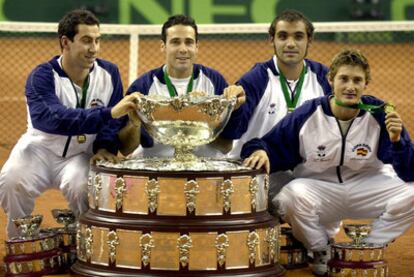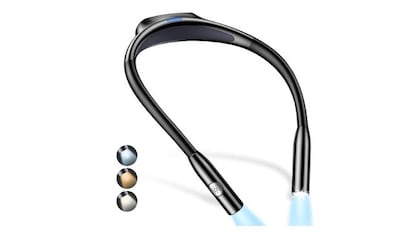"The first title broke a barrier"
Winners of Spain's first trophy look back 10 years to Barcelona glory
Spanish tennis today is a byword for success. But 10 years ago, on December 10, decades of frustrated hopes were ended on the clay court of Barcelona's Palau Sant Jordi: Juan Carlos Ferrero, Albert Costa, Àlex Corretja and Juan Balcells won the nation's first Davis Cup and in doing so healed the wounds of a generation of pioneers - Manolo Santana, Juan Gisbert, Alberto Arilla, Juan Manuel Couder and Manuel Orantes - who had trotted the globe in search of a trophy that twice eluded them in the final of the competition, in 1965 and 1967.
Pre-match pessimism
The build-up to the final was marked by three decisions: Carlos Moyà was left out of the team, Corretja would not play the first rubber and Todd Woodbridge, one of the greatest doubles specialists in history, would remain in Australia for the birth of his daughter. On Moyà - "the biggest problem," recalls Javier Duarte, one of Spain's coaches - "we acted with common sense. After six months out injured, Carlos was playing well but no better than Àlex or Albert. It was the most difficult decision."
"Are you going to lose? Is it now or never? I stopped reading the papers" "
Before they got off the plane they were saying the doubles was a certain point"
"For me," says Corretja, "The most difficult thing was the lack of confidence through the history of Spanish tennis. 'Are you going to lose?' 'Is it now or never?' people asked us. We were surrounded by a negative atmosphere. I stopped reading the newspapers and the cellphone and stayed in the hotel."
Friday: Ferrero to the fore
"I remember how nervous I was at the presentation. That anxiety will stay with me forever," says Costa, who played the first match against Lleyton Hewitt. "[Coach José] Perlas told me: 'play with responsibility but remember, if you lose, you won't die,' In the end it was a tough defeat (6-3, 1-6, 6-2, 4-6, 4-6). We got off on the wrong foot."
"I remember the nerves in the locker room," says Ferrero. "Going out after Albert wasn't easy." "We lost the first point by a whisker," recalls Duarte. "But Albert battered Hewitt, which meant [Sandon] Stolle would have to play the doubles." Ferrero, against the odds, beat Pat Rafter 6-7, 7-6, 6-2, 3-1 (retired). "When the day ended at 1-1, I saw [Australia captain] Newcombe signal his happiness at the score. We were happy too. Their best players were shattered and Àlex hadn't played yet."
Saturday: the heat rises
"People say the crowd in Barcelona can be cold, but in that critical moment they helped us a lot," says Duarte. In the doubles match, Corretja and Balcells took on Stolle and Mark Woodforde, one half of the formidable Woodies.
"Before they got off the plane they were saying it was a certain point," says Balcells. I remember what my coach, Pato Álvarez, said: 'When you are playing a game as important as this, all you want is for it to be over quickly.'" Spain won the doubles rubber 6-4, 6-4, 6-4.
Sunday: the barrier relief
Ferrero beat Hewitt on his fourth match point: "He was incredibly motivated and he had a fighting spirit that was out of the ordinary," Ferrero remembers. "But we were playing on clay." And Spain, with Ferrero's 6-2, 7-6, 4-6, 6-4 victory won its first ever David Cup 3-1.
The title resulted in many mustaches and beards being shaved and was received like a newborn baby. In 2009, Costa returned to the Palau Sant Jordi as captain of Spain's Davis Cup team, in search of its fourth title. The Czech Republic was crushed 5-0. "I talked to the players about how we felt in 2000," says Costa. "Of my fear of the court, because it slippery and fast. That first title broke a psychological barrier. It stopped being unattainable."

Tu suscripción se está usando en otro dispositivo
¿Quieres añadir otro usuario a tu suscripción?
Si continúas leyendo en este dispositivo, no se podrá leer en el otro.
FlechaTu suscripción se está usando en otro dispositivo y solo puedes acceder a EL PAÍS desde un dispositivo a la vez.
Si quieres compartir tu cuenta, cambia tu suscripción a la modalidad Premium, así podrás añadir otro usuario. Cada uno accederá con su propia cuenta de email, lo que os permitirá personalizar vuestra experiencia en EL PAÍS.
¿Tienes una suscripción de empresa? Accede aquí para contratar más cuentas.
En el caso de no saber quién está usando tu cuenta, te recomendamos cambiar tu contraseña aquí.
Si decides continuar compartiendo tu cuenta, este mensaje se mostrará en tu dispositivo y en el de la otra persona que está usando tu cuenta de forma indefinida, afectando a tu experiencia de lectura. Puedes consultar aquí los términos y condiciones de la suscripción digital.




























































